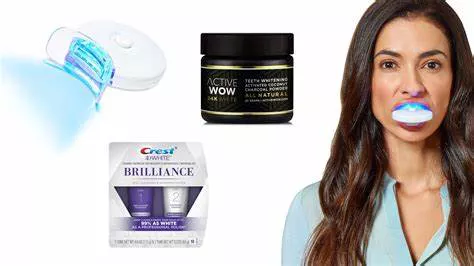Teeth whitening has become a popular cosmetic dental procedure, offering patients a brighter and more radiant smile. One of the key questions often asked is, “What is the main ingredient in teeth whitening products?” Understanding this ingredient is crucial for both dental professionals and patients seeking effective teeth whitening solutions.
What Is The Main Ingredient in Teeth Whitening Products?
The main ingredient in most teeth whitening products, especially those available over-the-counter, is a bleaching agent called hydrogen peroxide or carbamide peroxide. These agents work by penetrating the enamel and breaking down stains on the surface of the teeth. Hydrogen peroxide and carbamide peroxide are effective at whitening teeth because they release oxygen molecules that react with the discolored molecules, breaking them apart and making the teeth appear whiter.
In professional teeth whitening treatments performed at dental offices, the concentration of hydrogen peroxide or carbamide peroxide is typically higher than in over-the-counter products. This allows for more effective and quicker whitening results under the supervision of a dentist.
It’s important to note that while teeth whitening products can effectively lighten stains caused by food, beverages, and aging, they may not be suitable for all types of tooth discoloration. It’s recommended to consult with a dentist before starting any teeth whitening regimen to ensure it’s safe and appropriate for your dental health.
SEE ALSO: How Long Does GLO Teeth Whitening Last
Hydrogen Peroxide: The Powerhouse of Teeth Whitening
The main ingredient found in most teeth whitening products is hydrogen peroxide. Hydrogen peroxide is a powerful bleaching agent that effectively removes stains and discoloration from teeth. It is widely used in various concentrations in both professional dental settings and over-the-counter whitening products.
How Does Hydrogen Peroxide Whiten Teeth?
Hydrogen peroxide works by breaking down the molecules that cause discoloration on the surface of teeth. These molecules, known as chromogens, are responsible for stains from foods, beverages, and tobacco. When hydrogen peroxide comes into contact with these molecules, it oxidizes them, leading to a whitening effect on the teeth.
Concentration Levels of Hydrogen Peroxide
Teeth whitening products vary in their hydrogen peroxide concentrations. Professional whitening treatments administered by dentists often use higher concentrations of hydrogen peroxide, ranging from 15% to 40%, to achieve quicker and more dramatic results. Over-the-counter whitening products typically contain lower concentrations, usually between 3% to 10%, which are safer for at-home use but may require longer treatment durations for noticeable whitening.
Safety and Considerations
While hydrogen peroxide is highly effective in whitening teeth, its use requires careful consideration of safety factors.
Dental professionals must assess the patient’s oral health, enamel thickness, and sensitivity levels before recommending or administering hydrogen peroxide-based whitening treatments.
Potential Side Effects
One of the common side effects associated with hydrogen peroxide-based teeth whitening is tooth sensitivity. This occurs when the whitening agent penetrates the enamel and reaches the underlying dentin, triggering temporary sensitivity to hot, cold, or sweet stimuli. However, this sensitivity typically subsides after the whitening treatment is completed.
Alternatives to Hydrogen Peroxide
In recent years, advancements in dental technology have introduced alternative whitening ingredients that offer effective results with reduced sensitivity. These alternatives include carbamide peroxide, which breaks down into hydrogen peroxide and urea, and non-peroxide whitening agents such as sodium bicarbonate and activated charcoal. These options provide patients with choices that align with their sensitivity levels and whitening preferences.
Professional vs. Over-the-Counter Whitening Products
The choice between professional and over-the-counter whitening products depends on several factors, including the level of whitening desired, budget constraints, and the guidance of a dental professional. Professional treatments offer higher concentrations of hydrogen peroxide and customized application methods, leading to faster and more controlled whitening outcomes. On the other hand, over-the-counter products provide convenience and affordability but may require longer treatment periods for noticeable results.
Maintaining Whitening Results
After undergoing teeth whitening treatments, it’s essential for patients to adopt good oral hygiene practices to maintain their results. This includes regular brushing, flossing, and routine dental check-ups. Avoiding heavily pigmented foods and beverages such as coffee, tea, and red wine can also help preserve the brightness of newly whitened teeth.
Conclusion
In conclusion, hydrogen peroxide is the primary ingredient in teeth whitening products, renowned for its effective stain removal properties. Dental professionals play a crucial role in assessing the suitability of whitening treatments for individual patients and guiding them in achieving optimal whitening results while ensuring safety and oral health.
Understanding the main ingredient in teeth whitening products empowers both patients and dental providers to make informed decisions regarding cosmetic dental care.

